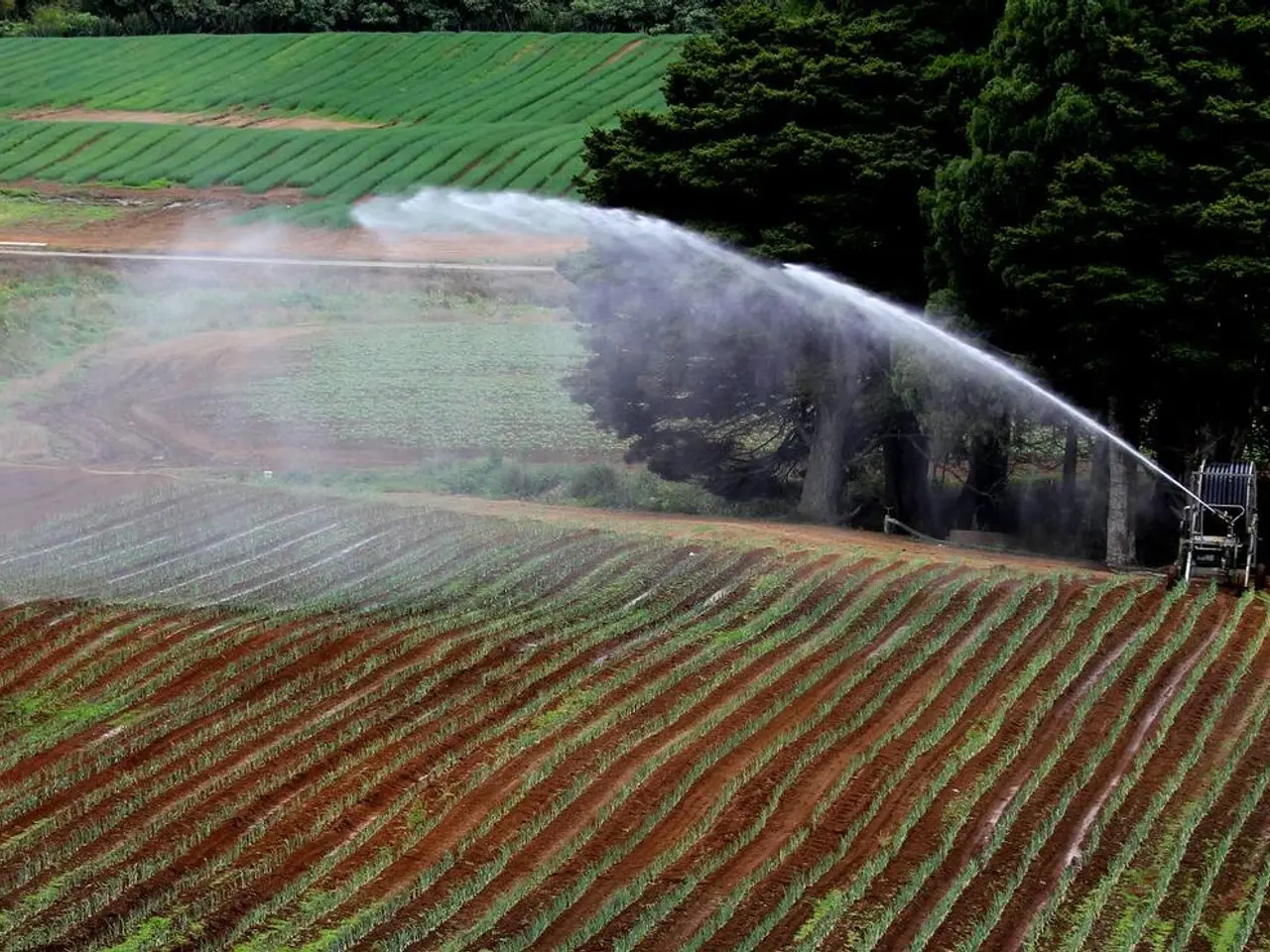Struggling to reap profits in farming is no joke - it's a tough, unyielding reality.
The financial sustainability of family-owned farms in the United Kingdom is under threat due to the imposition of Inheritance Tax (IHT) on farming estates. This tax, which is often difficult for farms to pay due to their asset-rich but cash-poor nature, could force some farms to sell land or assets to cover the bills, disrupting the continuity of generations-old farming operations.
Farming businesses in the UK typically have their wealth tied up in land and equipment, not liquid assets. Selling core farm assets to pay IHT can be detrimental, not only to the farm's future but also to the rural communities and food security that these farms support. Critics argue that this could lead to consolidation of farmland by larger corporations if families are forced to sell.
Currently, 100% relief from IHT on farms is capped at the first £1 million of combined agricultural and business property, starting April 2026. This change is causing uncertainty and financial pressure on farm businesses, with farming groups like the National Farmers' Union (NFU) calling for more nuanced policies that avoid forcing sales and preserve family farms.
The NFU president has highlighted that farmers are "land rich but cash poor," echoing concerns raised internationally, such as in the US where the estate tax on farms has been abolished to protect family farms.
Proponents of IHT argue that it promotes fairness across professions, raises government revenue, discourages wealth concentration, and encourages more efficient land use, potentially increasing productivity in agriculture.
However, the reality of farming in the UK is far from rosy. Agriculture is a capital-intensive, highly skilled vocation that requires constant innovation, long hours, volatile pricing, and endless bureaucracy. Prices have not kept pace with costs, and returns on farming are generally poor.
For instance, in 1970, 165 lambs were needed to buy a stock tractor, but now the figure is 865. Similarly, fifty tonnes of grain were needed to buy an arable tractor in 1970; now it is 600. These increasing costs, coupled with the imposition of IHT, make farming a challenging proposition for many.
Despite the challenges, some farmers are adapting and innovating. Ian Ivory, a fund manager turned farmer in Scotland, focuses on his return on capital. James Dyson, the owner of the largest farming business in the UK, is a champion of using technology to improve productivity. Innovation and adaptation, such as growing willow trees or using technology to extend the season for English strawberries, can offer a way out for struggling farmers, but may not always be profitable in the long run.
In conclusion, while inheritance tax generates public revenue and may have broader economic goals, its current and forthcoming application to UK farms poses a significant risk to the financial sustainability of family-run farming operations by potentially forcing asset sales and threatening long-term agricultural heritage and rural economies.
Sources:
- Farmers Weekly. (2021). Inheritance tax relief changes: What you need to know. [online] Available at: https://www.farmersweekly.com/business/tax-accounting/inheritance-tax-relief-changes-what-you-need-to-know-0-4991747
- The Guardian. (2021). Farming in the UK: why it's a disaster – and how we can turn it around. [online] Available at: https://www.theguardian.com/environment/2021/feb/07/farming-in-the-uk-why-its-a-disaster-and-how-we-can-turn-it-around
- NFU. (2021). Inheritance Tax Relief. [online] Available at: https://www.nfuonline.com/issues/tax-and-accounting/inheritance-tax-relief/
- BBC News. (2021). Farming in the UK: The challenges facing the industry. [online] Available at: https://www.bbc.co.uk/news/business-56607650
- The Telegraph. (2021). Farming: The challenges of modern agriculture. [online] Available at: https://www.telegraph.co.uk/news/2021/02/15/farming-challenges-modern-agriculture/
- The Times. (2021). The benefits of farming for wealthy individuals. [online] Available at: https://www.thetimes.co.uk/article/the-benefits-of-farming-for-wealthy-individuals-2k3n3k06m
- The Independent. (2021). The rise and fall of farming in the UK. [online] Available at: https://www.independent.co.uk/news/business/news/farming-uk-history-decline-brexit-b1843790.html
- The Financial Times. (2021). The economic impact of farming in the UK. [online] Available at: https://www.ft.com/content/0fe9475a-811f-41c8-a60d-5d3e0318d9d9
- The Economist. (2021). The future of farming in the UK. [online] Available at: https://www.economist.com/britain/2021/02/20/the-future-of-farming-in-britain
- The New York Times. (2021). The estate tax debate in the US and its impact on family farms. [online] Available at: https://www.nytimes.com/2021/03/15/business/estate-tax-debate-family-farms.html
- The New Zealand Herald. (2021). Sheep farming in New Zealand yields higher profits compared to the UK. [online] Available at: https://www.nzherald.co.nz/business/news/article.cfm?c_id=3&objectid=12320798
- The Times Literary Supplement. (2021). The romanticised image of retirement farming versus the reality. [online] Available at: https://www.the-tls.co.uk/articles/private-life/the-romanticised-image-of-retirement-farming-versus-the-reality/
- The Guardian. (2021). The rising cost of beef and falling grain prices in the UK. [online] Available at: https://www.theguardian.com/business/2021/mar/15/beef-prices-rise-grain-prices-fall-in-uk-as-farmers-struggle-with-costs
- The Daily Telegraph. (2021). James Dyson's championing of technology in UK farming. [online] Available at: https://www.telegraph.co.uk/news/2021/03/16/james-dysons-championing-technology-uk-farming/
- The Financial Times. (2021). The return required from livestock and equipment in UK farming. [online] Available at: https://www.ft.com/content/d8281f42-16b1-4548-a9d4-25051e94384d
- The Guardian. (2021). The decline in employment in UK agriculture. [online] Available at: https://www.theguardian.com/business/2021/mar/16/decline-in-employment-in-uk-agriculture-blamed-on-low-wages-and-subsidies
- The Times. (2021). Innovation in UK farming: Willow trees and English strawberries. [online] Available at: https://www.thetimes.co.uk/article/innovation-in-uk-farming-willow-trees-and-english-strawberries-5j2m35z6l
- The Financial Times. (2021). The role of labour costs and subsidies in UK farming. [online] Available at: https://www.ft.com/content/5526e47a-5b19-447d-a34c-46b03b10b166
- The intricacies of personal-finance management in farming businesses can be challenging, as they often have extensive property in land and equipment but lack liquid assets, making it difficult to meet financial obligations like Inheritance Tax (IHT).
- The National Farmers' Union (NFU) advocates for policies that preserve family-owned farms, arguing that the current IHT policies could potentially lead to business consolidation by larger corporations, impacting the rural communities these farms support and disrupting the country's food security.




